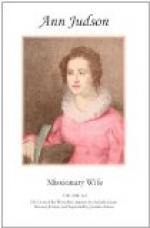In April, 1819, Mr. Judson preached in his new zayat to a congregation of fifteen or twenty persons, most of them entirely inattentive and disorderly. But feeble as was this beginning, it was regarded by the missionaries as an event of no ordinary importance. Here was the first altar ever erected for the worship of the true God in that country over which century after century had rolled, each sweeping its millions of idolaters into eternity; and rude and lowly as were its walls, compared with the magnificent temples that surrounded it, it was perhaps the fitter emblem of that spiritual religion which delights not in temples made with hands, but in the service of the heart, ’which is in the sight of God of great price.’
The building, which they called a zayat from its similarity to the public buildings of that name in Burmah, had three apartments; the first a mere verandah thatched with bamboo, open to the road, and the place where Mr. Judson received all occasional visitors and inquirers; the second or middle one, a large airy room, occupied on Sundays for preaching and on week days as a school-room; and the last division, a mere entry opening into the garden leading to the mission-house. During the week Mrs. Judson occupied the middle room, giving instruction in reading, &c., to a class of males and females; and also in conversing with female inquirers. Here she also studied the Siamese language, much spoken in Rangoon, and translated into that language a catechism, and the Gospel of Matthew.
The 30th of April, 1819, was made memorable by the first visit of an inquirer who became a convert to the Christian faith. On the 5th of May Mr. Judson says in his journal, “It seems almost too much to believe that God has begun to manifest his grace to the Burmans, but this day I could not resist the delightful conviction that this is really the case. Praise and glory to his name for evermore. Amen.”
From this time we learn from Mr. Judson’s journal, that the verandah of the zayat where he sat to receive visitors, was constantly thronged with natives, who, impelled, some by curiosity and idleness, and some by better motives, came to talk about the new religion. So much however was to be dreaded, in the opinion of most of these, from the “lord of life and death,” as they called the emperor, that few dared follow out their convictions. Moung Nau, however, the convert above mentioned, adhered steadfastly to his now faith, and desired baptism. Not having any doubt of the reality of his conversion, Mr. Judson administered the ordinance to him on Sunday, June 21. On the following Lord’s day, the missionaries had the unspeakable satisfaction of sitting down at the Lord’s table for the first time with a converted Burman; and as Mr. Judson writes, he had the privilege to which he had been looking forward many years, of administering the communion in two languages.




